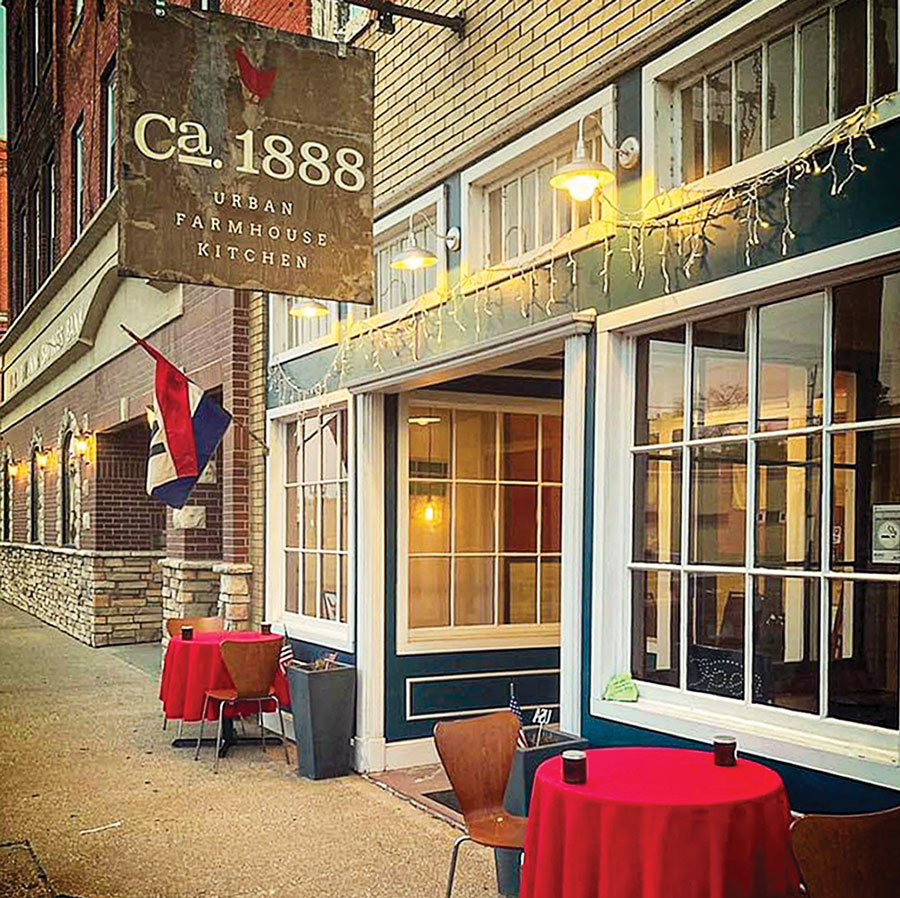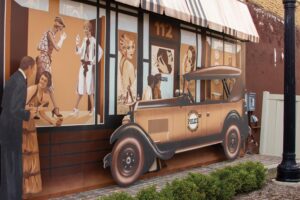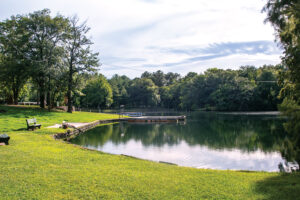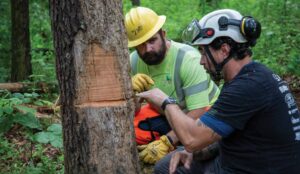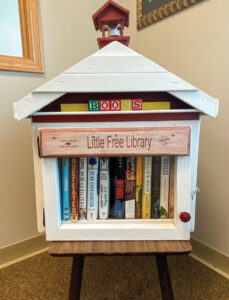
Thousands of people in Illinois have joined an international book-sharing movement, one that began with a son’s simple but poignant tribute to his mother, who had been a teacher and avid reader. Todd Bol built a model of a one-room schoolhouse, placed it on a post in his yard and filled it with books that friends and neighbors were encouraged to borrow.
In 2012, three years following the installation of that library in Hudson, Wis., Bol co-founded a nonprofit organization called Little Free Library with Rick Brooks, based on the two men’s shared passion for social enterprise. The library built in honor of Bol’s mother would later be officially registered as the first Little Free Library book exchange. Today the model schoolhouse can be found at the organization’s headquarters.
According to Margret Aldrich, director of communications for the nonprofit, of the 125,000 Little Free Library book exchanges that now exist worldwide, there are more than 2,700 registered in Illinois alone. An interactive map on the organization’s website shows the locations along with charter numbers and origin stories for many of them.
Those stories vary, from similar tributes to loved ones to book lovers invested in their communities and boy scouts and girl scouts earning badges for community service. Some libraries have been set up by teachers and former educators, others by rotary clubs and former librarians. Many of them offer access to free reading material in small towns and rural areas where resources are otherwise limited.

Aldrich says it was “magic” when the two co-founders met and collaborated on the ways they could actualize their desire to create a network that would both inspire readers and build community. She says in the beginning they gave materials away to fuel the movement. Word of mouth and press opportunities originally put the concept in front of people, but Aldrich says it was the internet and social media that gave participants the opportunity to share visually appealing photos of their creations and ultimately expand the reach of the movement.
Aldrich authored the book “The Little Free Library” in 2015 and joined the organization a year later. “Our mission is expanding book access where there is none,” she says, adding that they recently registered a library on the South Pole and now have Little Free Libraries on all seven continents.
While getting to hear and share the stories of Little Free Library stewards around the world is her favorite part of the job, Aldrich also enjoys witnessing the creativity of those who get involved—from little libraries built to resemble rocket ships and Victorian mansions to hollowed out tree trunks visitors can actually enter.
That creativity can be seen in the Little Free Libraries across Illinois. In 2016, Bill and Katie Disney built one in Ridgway. Katie had seen little libraries in different parts of the country, and a friend told her more about the idea behind them. She says her husband Bill, a retired school administrator who knows the value of reading, is also a skilled woodworker, which turned out to be fortuitous. He embraced her idea, building a library to serve all ages in their agricultural area.
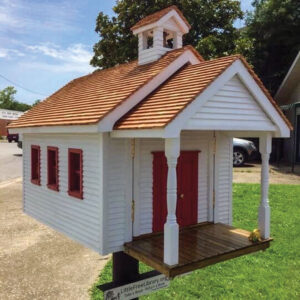
“One end is a schoolhouse with kids’ books, and the other side [for adults] is a barn, representing our farming community,” she says. “There’s a little plastic dog on the school’s porch, like old country schools.” In the beginning, she adds, “we had no idea how it worked.” But, with no library in the small town of 900, she says theirs has worked wonderfully and never runs out of books.
Sometimes that creativity can be found in the location, as with the Little Free Library located in front of the Davie School Inn in Anna. Owner Lyle Woodrum gave it to his wife Tammy, fellow owner and book lover, for her birthday. “We thought it would be a nice fit in front of an actual school,” he says.
Built in 1910, the former elementary school closed in the late 1990s and is now a bed and breakfast serving guests exploring southern Illinois. Lyle adds that they’ve had a lot of fun with the library. “It’s nice to see how many people in town take it upon themselves to restock it, unbeknownst to us.” Even with snow on the ground, he says, people stop by to donate books.
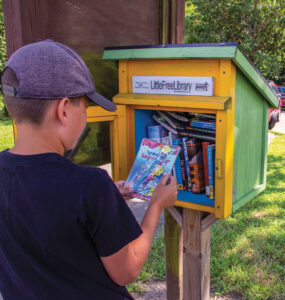 They aren’t the only ones who have received a positive response from their community. Lorachelle Eck, patron services manager of the public library located in Rochester, says they have seen an awesome community response to the two locations local boy scouts installed in town. “We went daily at first,” she said. “Now we don’t have to maintain them. They are pretty much self-sufficient.” The first structure was built by the library staff at a Little Free Library “Build Day” held at the Illinois State Library, the second was constructed by library board member Dave Hicks.
They aren’t the only ones who have received a positive response from their community. Lorachelle Eck, patron services manager of the public library located in Rochester, says they have seen an awesome community response to the two locations local boy scouts installed in town. “We went daily at first,” she said. “Now we don’t have to maintain them. They are pretty much self-sufficient.” The first structure was built by the library staff at a Little Free Library “Build Day” held at the Illinois State Library, the second was constructed by library board member Dave Hicks.
Allison Robison, a librarian for Goreville School District in southern Illinois and member of Southern Illinois Electric Cooperative, has shared a similar experience. She and her husband, the high school ag teacher and FFA advisor, have worked together with students to create not one, but three libraries for the community. “I had read about them in the Sunday paper years ago,” Allison says. “His class builds them, and I paint them.”
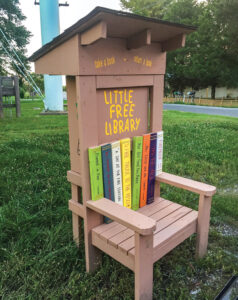
According to their entry on the Little Free Library world map, “Our small community of less than 1,000 has never had a public library. With the manpower and skills of the high school agriculture students and FFA members, we now have a Little Free Library near the school so that all community members have a safe, easily accessible library. Students and citizens have donated hundreds of books to make this successful.”
The first of the three libraries is located near the school and has been functional for about six years. “There’s no library in town, and the school is the main hub,” she says, adding that people living in outlying areas not within walking distance of the school began requesting ones closer to them. Allison says she only checks them every three to four months, that they for the most part maintain themselves, with the exception of storm or structural damage. A fourth location may also be in the works at the behest of a fellow teacher and owner of the gym in town.
Little Free Libraries can be found in more remote locations as well, like the one standing on the end of the lane to the barn on No Bad Days Farm in Shelbyville, on Shelby Electric Cooperative lines. The small hobby farm, run by Kenny and Stephanie Swengel, their two daughters and their husbands, began as a way to honor their late son and brother, Tucker. “No bad days” was his motto. “He was the whole reason we did it at all,” says Stephanie. “It helps with the grieving, hands in the dirt, helping others.”
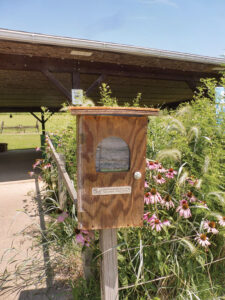
Stephanie says the library was a perfect addition. “I had seen one before, but I wasn’t sure where. I thought it was a neat idea,” she says. In the two years since its construction, they have noticed donations, even in their rural area, from passers-through on their way to Lake Shelbyville and from their small subdivision of 16 houses.
The McCully Heritage Project, an environmental center in rural Kampsville, located on Illinois Electric Cooperative lines, is yet another unanticipated location for a Little Free Library, the books contained in a repurposed owl house. “Our board members thought it was a really good idea,” says Michelle Berg Vogel. “There’s not a lot of access to libraries and there are always books coming through the office.”
She says they stock all kinds of books, but some are pertinent to their mission of providing quality environmental education and the opportunity for the public to appreciate the cultural, historical and natural resources of the lower Illinois River valley. Visitors can also occasionally find puzzles and seeds in the former owl house. Their library was installed in July 2019 and continues to function despite a devastating flood to the area one year and the COVID-19 pandemic the next.
Occasionally issues like these arise, as they did for Heyworth Library near Bloomington. Assistant Librarian Jacque Stengel says their board wanted to do something for the community—the result was a Little Free Library in Heyworth Centennial Park, established about a year ago. Unfortunately, recent flooding prevented access for a time.
Still, “you find them everywhere, sometimes where you least expect,” says Lindy Schenk, a member of Adams Electric Cooperative and a Title 1 teacher in Astoria, who helps children in several grades with reading. A local woodworker built her Little Free Library with a roof that looks like the spine and pages of an open book. “I thought it was a cool touch,” she says.
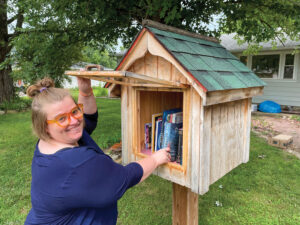
Lindy says anything counts and she has seen all kinds of designs—wood, shingles, even benches for little kids to stand on and look inside. Her library has two sides, one for kids and one for readers of all ages. While she curates most of the children’s collection through places like Scholastic, she says the adults in town do most of the donating for the rest.
“Put it somewhere you can monitor,” she says. “You can get some good from it, too.” Lindy also suggests adding personal touches. She might put out a canister of bookmarks or even snacks if she knows her students are coming by. “Think unique—cookbooks, magazines, puzzles.”
She adds that a person doesn’t have to be a reader to get enjoyment out of one, and there are tons of ideas online to personalize the structure and create a unique experience, including leaving sticky notes for mini book reviews or a guestbook for visitors to sign. Hers is about the size of a doghouse, suspended in air. “Mine is a ‘go big or go home,’” she says. “There’s room for everything in there.”
According to Little Free Library’s Margret Aldrich, there is a one-time fee of $40 to register a Little Free Library. The fee pays for a charter sign and other benefits, including access to book giveaways and free and reduced-cost titles, as well as access to a private Facebook site where stewards can find answers to questions, advice from other library owners and the opportunity to connect with others in their own community and beyond. “New stewards have said they meet more neighbors in a week than they have in years,” she says.
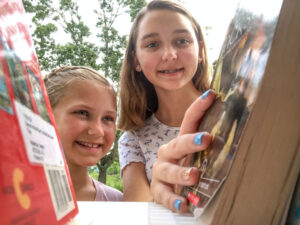 Illinois Little Free Library stewards have a few tips to share with people interested in participating. Katie Disney says that old and torn books garner less interest; Lindy Schenk recommends some sort of UV protection if books will be exposed to sunlight, or they will fade. Some owners and communities have installed sensors and/or cameras to monitor activity. Almost all say there is no need to worry about the flow of books in and out.
Illinois Little Free Library stewards have a few tips to share with people interested in participating. Katie Disney says that old and torn books garner less interest; Lindy Schenk recommends some sort of UV protection if books will be exposed to sunlight, or they will fade. Some owners and communities have installed sensors and/or cameras to monitor activity. Almost all say there is no need to worry about the flow of books in and out.
For those interested in joining the book-sharing movement, a wealth of information can be found at littlefreelibrary.org, including library plans and installation tips. Other resources to aid in the process are an online store featuring library kits, book bundles, signs and accessories, as well as ways to donate.
Prior to Little Free Library Founder Todd Bol’s passing in 2018, he was quoted as saying, “I really believe in a Little Free Library on every block and a book in every hand. I believe people can fix their neighborhoods, fix their communities, develop systems of sharing, learn from each other, and see that they have a better place on this planet to live.” Through their individual efforts, Little Free Library stewards in Illinois and around the world are making his vision a reality.
Little Free Library Programs
Read in Color: Launched in 2020, the Read in Color initiative promotes diversity in the reading selections made available to readers through Little Free Library book exchanges, in hopes that people will have the opportunity to read of experiences other than their own and that readers in underrepresented communities will see their own worlds reflected as well. For more information, visit littlefreelibrary.org/read-in-color/.
The Impact Library Program: This program was designed to provide no-cost Little Free Library book exchanges in areas where books are scarce. More than 1,350 libraries have been provided through this initiative. To find out how to donate or to apply for a library, visit littlefreelibrary.org/impact-about/.




